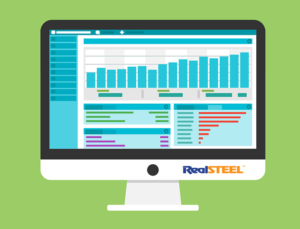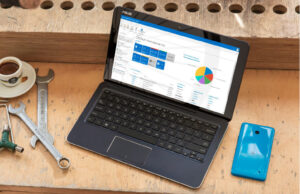 Enterprise resource planning (ERP) is the brain of every successful business. It performs innumerable operational tasks that were once the domain of dozens of employees and countless reams of paper.
Enterprise resource planning (ERP) is the brain of every successful business. It performs innumerable operational tasks that were once the domain of dozens of employees and countless reams of paper.
Do you need extra inventory? Are sales stagnating or picking up? Are invoices getting paid on time? With ERP forecasting, you’ll have answers to all of these questions and more.
What is Forecasting in ERP?
ERP forecasting uses complex systems and algorithms to predict trends. By performing market analyses and processing historical data, ERP can give businesses a jumpstart on future trends, allowing them to make proactive changes that improve productivity and efficiency.
ERP provides forecasting capabilities across multiple areas of the business:
ERP Demand Planning
Are there specific months when demand is high? Are there products that perform better during certain seasons?
You could track product sales throughout the year and find the common denominator, or you could let your ERP system do its thing.
ERP on-demand forecasting provides insights into busy and slow periods, allowing you to prepare your stock accordingly. It means you can re-stock proactively and not reactively, ensuring you have the products when you need them and can keep up with a sudden surge in demand. Fewer orders are refused, no orders are delayed, and you have more happy customers.
Sales Forecasting in ERP
Can production keep up with sales demand? Are your distribution lines adequately prepared to meet customer needs? Not only does sales forecasting keep the money flowing, but it also means you never have to refuse or delay a client, thus strengthening relationships.
Financial ERP Predictions
Financial ERP analyses your finances as they stand now and predicts where they will be in the future. Information is processed in real time, giving you instant insights into costs, income, and profit margins. This is particularly important in the sheet metal fabrication industry, where profit margins can be as low as 4%, and a single over-order or failed delivery could tip your projections into the red.
How ERP Forecasting Uses Business Intelligence and Real-Time Data
ERP forecasting is not speculative. It doesn’t work by making random predictions based on sparse information. It uses business intelligence features and advanced reporting capabilities to process vast amounts of data from the business and its associated industry. This information is then analyzed to highlight trends and make predictions.
Sales managers and finance teams can use this information to make better decisions with regards to marketing, procurement, and production. They’re not going into the next quarter blind. They have an idea of what will transpire and can make sure they are ready to deal with all eventualities.
How are ERP Systems Implemented?
ERP forecasting implementation is a multi-stage project that necessitates redesigning a business’s existing infrastructure, improving system capabilities, configuring the ERP software, and then migrating it over. Existing data will need to be transferred onto the new system, and this can be time-consuming if that data is stored on multiple systems.
The final system must then be checked and audited, and staff should be trained on how to use it properly. ERP integration is often performed by an experienced project team whose job is to successfully implement the system and ensure it will continue to run smoothly in their absence.
What are the Challenges of Implementing ERP Forecasting?
As beneficial as ERP forecasting can be for an organization, it’s not without its challenges:
- Employee training: For a business to achieve the maximum benefits from ERP forecasting, its employees need to know how to use it. Some employees might be more receptive than others, though ERP training programs and consultants can help to speed things up.
- Resistance to change: If a company has been used to doing things a certain way for many years, executives may be reluctant to change.
- Time and cost: A proper implementation can be costly and time-consuming for large businesses, often requiring a specialist implementation team, as well as post-implementation training. However, the benefits far outweigh the costs.
- Data integration: ERP provides a single data source for the entire organization, but switching to this source can be problematic if the company originally used multiple data points from various systems.
- Change management: ERP implementing may require a major business overhaul, one that involves changing multiple business process to ensure the organization is ready to take advantage of the productivity and efficiency benefits that ERP forecasting can bring.
Summary: What is Forecasting in ERP?
Advanced ERP forecasting systems like RealSTEEL give companies greater business and industry insights. They are the crystal ball that every business needs to predict the otherwise unpredictable and ensure they are ready for any eventuality. If you have ever been suddenly overwhelmed with orders you can’t fulfill or have been left scratching your head at sudden, unexplained sales or financial changes, ERP forecasting could provide the answers you need.
Contact us today to learn more about how ERP forecasting can improve efficiency and productivity while giving your profit margins a much-needed boost.
FAQs about ERP Forecasting
What is ERP in strategic planning?
ERP systems help businesses manage every aspect of their company, from supporting automation and handling key financial processes to dealing with procurement, tracking inventory, analyzing the production process, and predicting changes in demand.
How can a sheet metal fabrication business benefit from ERP demand forecasting?
Demand forecasting in ERP systems helps businesses to predict when demand will increase and ensures they are ready to meet it. Slow supply chains and production processes mean that fabricators aren’t always able to meet a sudden influx of orders, but if they know about that influx ahead of time, they can plan accordingly.
What is a KPI in ERP?
KPI stands for “key performance indicator”. It’s a quantifiable performance metric that is essential for the continued management of the business. Some KPIs in sheet metal fabrication ERP may include production or efficiency gains, both of which measure the successful implementation of the ERP system.




